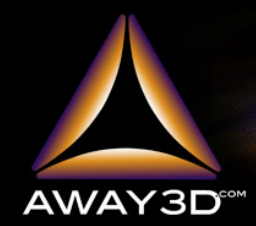Away3D
 | |
| Developer(s) | Rob Bateman, Alexander Zadorozhny, Fabrice Closier, Peter Kapelyan, Greg Caldwell, Andreas Engstrom, Stephen White, David Lenaerts, Richard Olsson, Cauê Waneck [1][2] |
|---|---|
| Stable release | 3.6.0
/ September 27, 2010 |
| Repository | |
| Operating system | OS independent |
| Type | Flash 3d engine |
| License | Apache License 2.0 |
| Website | http://away3d.org |
Away3D is an open source 3D graphics engine, written for the Adobe Flash platform in ActionScript 3, and runs in modern web browsers that utilize Adobe Flash Player.
Away3D can be used to render 3D models and perform various other 3D computations. It was started in 2007 by Alexander Zadorozhny and Rob Bateman[3] as a port of Papervision3D, an older and less popular 3D graphics engine also built for Adobe Flash. It supports hierarchical object transformation with features such as position, rotation and scaling, rendering of bitmap textures, and real-time lighting using Phong shading or Gouraud shading.[4]
The newest version, Away3D 4, has been upgraded to support the latest Flash Player 11 with fully GPU accelerated graphics, freeing up the CPU for other computational tasks. Since Graphics Processing Units are capable of rendering many more textured triangles per second, it allows for much more detail and quality, and up to 100,000 triangles per frame instead of the typical 1,000.[5] The Away3D project also maintains flavors of the source code for Flash Player 10 with limited 3D GPU acceleration, for Flash Player 9 and below, and Away3DLite, a compacted version of the engine.
Away3D has also been ported to the haXe multiplatform language, enabling it to be converted to JavaScript and other languages that support graphics. The JavaScript port of Away3D has also been integrated with the WebGL layer to utilize browser based 3D GPU acceleration.
References
- ^ Away3D page, at the OSFlash Wiki.
- ^ Away3D Team, at the Official Website
- ^ Away3D project page, Google code
- ^ Away3D, FlashMagazine
- ^ [1], Away3D.com
External links
- Away3D Official Website
- Google code repository for Away3D
- Getting Started With Away3D 4 Video Session
- Away3D page, at the Open Source Flash wiki.
